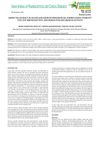 20 citations,
July 2015 in “Journal der Deutschen Dermatologischen Gesellschaft”
20 citations,
July 2015 in “Journal der Deutschen Dermatologischen Gesellschaft” Green tea may help with skin health and protect against UV damage, but more research is needed to confirm its safety and effectiveness.
 5 citations,
January 2013 in “PubMed”
5 citations,
January 2013 in “PubMed” Green tea may help with various skin conditions and protect the skin when taken orally or applied topically, but its effectiveness is not always proven.
July 2011 in “Hair transplant forum international” No clear evidence links green tea to hair loss through iron deficiency.

Green tea extract helped heal rabbit skin burns better than antibiotic ointment.
 1 citations,
August 2020 in “Food Research”
1 citations,
August 2020 in “Food Research” Plant extracts like Avicennia marina, Boehmeria nipononivea, and Camellia sinensis could potentially treat hair loss with fewer side effects than synthetic drugs.
 December 2022 in “Korean journal of medicinal crop science/Han-gug yagyong jagmul hag-hoeji”
December 2022 in “Korean journal of medicinal crop science/Han-gug yagyong jagmul hag-hoeji” Natural extracts like ginseng, green tea, shiitake, and aloe vera may help prevent hair loss by protecting hair-related cells.
 6 citations,
May 2009 in “Cell transplantation”
6 citations,
May 2009 in “Cell transplantation” Green tea component EGCG helps keep rat skin grafts viable longer.
Low-temperature extracts of black beans, peony, and green tea improve scalp health and are better than traditional hot-water extracts.
 1 citations,
November 2023 in “Journal of cosmetic dermatology”
1 citations,
November 2023 in “Journal of cosmetic dermatology” The new anti-dandruff shampoo with ketoconazole-coated zinc oxide nanoparticles is more effective against dandruff.
 January 2024 in “Brazilian Journal of Hair Health”
January 2024 in “Brazilian Journal of Hair Health” Some plant-based products might treat hair loss with fewer side effects than current medications.
15 citations,
December 2009 in “American journal of clinical dermatology” The effectiveness of alternative treatments for alopecia areata is uncertain and needs more research.
 March 2023 in “International Journal of Advanced Research in Science, Communication and Technology”
March 2023 in “International Journal of Advanced Research in Science, Communication and Technology” Various medicinal plants like Polygonum multiflorum, Red ginseng extract, and Zizyphus jujuba can potentially treat hair loss, offering benefits like low cost and multiple ways of working. Other effective natural substances include Pygeum africanum, Seneroa, Urtica dioica, and more.
 January 2023 in “International Journal of Multidisciplinary Research and Growth Evaluation”
January 2023 in “International Journal of Multidisciplinary Research and Growth Evaluation” Green tea might help manage hair loss from androgenetic alopecia.

Diet and supplements can significantly affect acne, with some foods and nutrients reducing and others worsening it.
 108 citations,
November 2006 in “Phytomedicine”
108 citations,
November 2006 in “Phytomedicine” Green tea component EGCG could potentially promote human hair growth.
 January 2015 in “Hair therapy & transplantation”
January 2015 in “Hair therapy & transplantation” Some botanical products may help increase hair growth in people with alopecia, but more research is needed.
9 citations,
May 2018 in “Photochemistry and photobiology” The Hair BB Cream effectively prevents UV damage and improves hair health.
April 2019 in “Agriculture and natural resources”  June 2017 in “Asian journal of pharmaceutical and clinical research”
June 2017 in “Asian journal of pharmaceutical and clinical research” Green tea extract gel safely increases eyelash length.
2 citations,
August 2007 in “PubMed” Topical scalp treatments could potentially reduce hair extraction.
8 citations,
January 2012 Green tea polyphenols are beneficial for various skin and hair conditions and are increasingly popular in cosmetics.
3 citations,
January 2014 Green tea extract hair tonic is stable at room temperature, promotes hair growth better than minoxidil, and is safe for use.
Green tea compound EGCG could potentially treat colorectal cancer by removing iron and causing stress in cancer cells leading to their death.
6 citations,
December 2014 in “PubMed” A supplement for hair loss with green tea in it may cause liver problems.
 16 citations,
January 2016 in “Annals of Dermatology”
16 citations,
January 2016 in “Annals of Dermatology” Green tea component EGCG may help prevent hair loss by changing microRNA levels in certain scalp cells.
48 citations,
March 2005 in “PubMed” Some plant-based compounds might help control the growth of new blood vessels if further research confirms their effectiveness.
 95 citations,
February 2018 in “Dermatology and Therapy”
95 citations,
February 2018 in “Dermatology and Therapy” Nutraceuticals may improve skin health and protect against aging, but more research is needed on their optimal use and possible health risks.
 22 citations,
March 2018 in “American Journal of Clinical Dermatology”
22 citations,
March 2018 in “American Journal of Clinical Dermatology” New acne treatments show promise as alternatives to traditional therapies.
 4 citations,
March 2012 in “Annals of oncology”
4 citations,
March 2012 in “Annals of oncology” New treatment with green tea polyphenols and nicotinamide improves skin problems from cancer therapy.
 3 citations,
June 2009 in “The journal of alternative and complementary medicine/Journal of alternative and complementary medicine”
3 citations,
June 2009 in “The journal of alternative and complementary medicine/Journal of alternative and complementary medicine” Green tea extract may help reduce excessive hair growth.



















